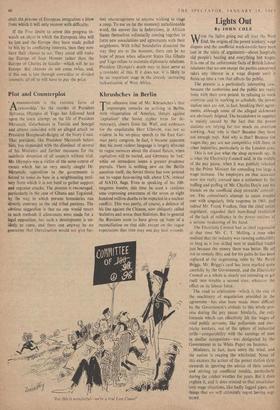Lights Out
By JOHN COLE the lights going out all over the West End, the origins of the power workers' wage dispute and the unofficial work-to-rule have been lost in the mists of arguments—about hospitals, old people's heating and everything but wages,. It is one of the unfortunate facts of British labour relations that no one except the parties concerned takes any interest in a wage dispute until it flares up into a row.that affects the public.
The present is a particularly interesting case, because the authorities and the public are really hoist with their own petard. In refusing to work- overtime and in working to schedule, the power station men are not, in fact, breaking their agree-. ments, although some of the alleged sicknesses are obviously feigned. The breakdown in supplies is mainly caused by the fact that the power, stations are relying far too much on overtime working. And why is that? Because they have not enough men. And why is that? Because the . wages they pay are not competitive with those in other industries, particularly in the London area.
This is not just what the shop stewards say. It is what the Electricity Council said, in the middle of the pay pause, when it was publicly rebuked by the Prime Minister for conceding too large ,a • wage increase. The employers on that occasion were not really coerced into a settlement by the • huffing and puffing of Mr. Charles Doyle and his friends on the unofficial shop stewards' commit- tee. The committee's attempt to cause trouble met with singularly little response in 1961, and indeed Mr. Frank Foulkes, then the chief union negotiator, regarded their ham-fisted revelation of the lack of militancy in the power stations as a serious weakening of his hand.
The Electricity Council had as chief negotiator' at that time Mr. C. T. Melling, a man who realised that the industry was running unhealthily so long as it lost skilled men to unskilled tradefi just because the money there was better. He set out to remedy this; and for his pains he has been replaced at the negotiating table by Mr. PerCY Briggs. Mr. Briggs's card has been marked quite carefully by the Government, and the Electricity' Council as a whole is clearly not intending to get itself into trouble a second time, whatever the effect on its labour force.
The road to arbitration—which is the end of the machinery of negotiation provided in the agreement—has also been made more difficult by the Government's attitude to this whole pro- cess during the pay pause. Similarly, the only formula which can effectively lift the wages of vital public servants, like policemen and elec- tricity workers, out of the sphere of industrial strife—comparability with the earnings of men in similar occupations—was denigrated by the Government in its White Paper on Incomes.
Ministers, in fact, have sown the wind, and the nation is reaping the whirlwind. None of this excuses the action of the power station shop stewards in ignoring the advice of their unions and stirring up unofficial trouble, particularly during the coldest weather for years. But it does explain it, and it does remind us that unsatisfac- tory wage situations, like badly lagged pipes, are . things that we will ultimately regret having neg- lected.






























 Previous page
Previous page